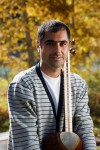The delicate strings of the setar take a lifetime to master, said Farzad Amoozegar.
For the UCLA anthropology and ethnomusicology graduate student, his studies began when he was 6 years old and his grandfather introduced him to the instrument, but really took off when he began studying under Persian classical master Mohammad-Reza Lotfi in Berkeley.
On Thursday, Amoozegar will dedicate his tar and setar performance to his mentor Lotfi at the Fowler Museum. Amoozegar said Lotfi, who died on May 2, 2014, had been a pivotal figure in his learning of classical Persian music. Danny Shamoun will join Amoozegar to perform Anatolian music on the nay and darbouka.
“Classical Persian music is orally transmitted. … You basically learn a bit from your master and learn to embellish,” Amoozegar said. “(Lotfi) is the reason for me even studying music.”
Amoozegar said he has additionally worked closely with ethnomusicology professor Steven Loza, performing in an intercultural improvisation group and conducting an independent study on concepts of religion and music.
Loza said Amoozegar embodies the intercultural goals of the UCLA Department of Ethnomusicology.
“Ethnomusicology is interested in cross-cultural aesthetics,” Loza said. “(Amoozegar) is a guy who’s really challenged himself … and who’s also a master musician, specifically on the setar.”
Amoozegar is not the only performer at Thursday’s Fowler Out Loud performance who has been inspired by masters of his musical traditions.
Danny Shamoun, who will be opening the concert on the nay and darbouka instruments of the Anatolian musical styles, said he is not a student at UCLA but a performer in UCLA’s Near East Ensemble. He said he became very close to A.J. Racy, a UCLA professor in ethnomusicology, who has guided him through the Middle Eastern musical tradition.
“Racy allowed me to learn the nay a couple years ago when I approached him as a lover of the arts,” Shamoun said. “I just started this journey of learning different rhythms and patterns of the classical world for about 10 years now.”
Shamoun said his family background from northern Syria and southern Turkey also contributed to his interest in Anatolian music.
“Anatolian music evolved from Syrian, Persian, Turkish, Iraqi and Armenian cultures blending into one,” Shamoun said. “It’s in my blood.”
Accompanied by visiting performers, including keyboardist Prince Jack and violinist Murat Daslik, Shamoun said his set combines pieces as modern as the 1990s to as far back as the late 1800s. He said his trio will intertwine jazz chords over their maqam, or musical scalar system.
Amoozegar will have a drummer for accompaniment and will present a traditional Persian suite. Persian suites, Amoozegar said, begin with free-flowing improvisation, then build on a more rhythmic piece. Then, he said the piece slows again until the drums return in a faster tempo before climaxing.
“Either it fades again and ends with a really fast composition, or it dies down slowly,” Amoozegar said. “But they’re both really beautiful.”
Amoozegar and Shamoun agree that their Fowler Out Loud performance is presenting them the opportunity to expose sounds of their respective instruments that are uncommon in so many parts of the world. Nevertheless, Amoozegar said he has been surprised with the local interest in Iranian music, both when he lived in Canada and in Westwood.
“The two cities I lived in in Canada – Toronto and Vancouver – there was a huge Iranian community,” Amoozegar said. “There is also interest here at UCLA, even with the younger generation.”
This is the first time Shamoun and Amoozegar will be collaborating at a live concert, having only performed together in class ensembles. Although Shamoun will be presenting music from an Anatolian tradition and Amoozegar from the classical Persian repertoire, they said their collaboration of Middle Eastern sounds is still cohesive.
“It’s really wonderful to be able to display the sounds that are dear to my heart and dear to his,” Shamoun said. “It’s the music of our ancestors.”
